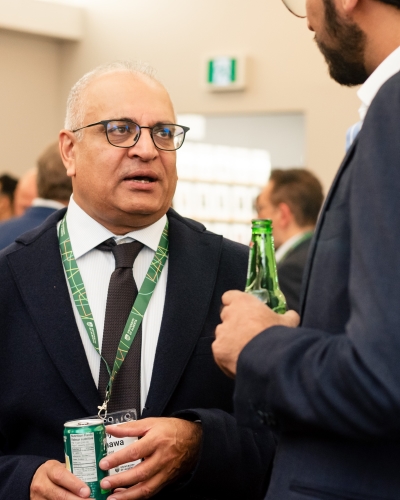U of A grad Sukhjit Randhawa makes waves and builds connections in business and South Asian Indian diaspora communities
Doug Johnson - 20 November 2024
Members of the South Asian diaspora, the business community and others gathered at the Alberta School of Business (ASB) building on Oct. 2 for an evening of panel talks and networking. Called the 2024 Diaspora Entrepreneurship Event, it was co-organized by the ASB and Sukhjit Randhawa, a University of Alberta graduate and president and CEO of Zip Equity Corporation.
For Randhawa, who has decades of experience in the business world, Diaspora 2024 was a way to highlight the meaningful contributions that the South Asian Indian diaspora have made to Canada’s economy, culture and politics — including his maternal uncle, Raj Pannu a former professor at the University of Alberta’s departments of educational policy studies and sociology, and a former MLA and leader of the Alberta NDP. He says that — even beyond the list of high-profile panelists from the South Asian Indian diaspora and business communities — there was a positive energy in the room that was incredible to see.
“Diaspora 2024 is particularly important to me because it’s a powerful platform to celebrate, elevate and strengthen the South Asian Indian diaspora community within Canada,” he says. “Personally, it’s a chance to connect with like-minded individuals and showcase the incredible talent, innovation, and entrepreneurial spirit within the South Asian Indian diaspora.”
Randhawa graduated from the U of A with a bachelor’s in economics in 1993. Since then, he’s kept ties with his alma mater. For instance, Diaspora 2024 came about from a conversation between him and Vikas Mehrotra, dean of the ASB, who was also co-host of the event.
While not an ASB grad himself, Randhawa has had a great amount of success in business. Some of this success, he says, comes from his time at the U of A, and the connections he made there.
Building connections
 During his undergrad, Randhawa learned a great deal. He says the experience was “pivotal in shaping my understanding of economics and market dynamics. Studying economics honed my analytical skills, which have been invaluable in my career, especially in real estate and investment.”
During his undergrad, Randhawa learned a great deal. He says the experience was “pivotal in shaping my understanding of economics and market dynamics. Studying economics honed my analytical skills, which have been invaluable in my career, especially in real estate and investment.”
However, this period in his life also taught him the importance of adaptability and forward thinking, helping him navigate the ever-evolving economic landscape. It also helped him create a network and develop relationships. For instance, he was involved in the Phi Delta Theta fraternity, helping him develop this network and make connections.
“In many ways, the social experiences and connections I built were as important as the lessons in the classroom,” he says.
After graduating from the U of A, Randhawa also completed the Canadian Securities Course (CSC) through the Canadian Securities Institute in 1992. This, in turn, laid the foundation for his work in investment and capital markets. He also completed both the real estate and mortgage courses. It was this extensive background that led him to explore a career in business and investment opportunities more broadly, and it sparked an interest in capital markets, he says.
In 2006, he became the president and CEO of Zip Equity Corporation, a position he has held for nearly two decades. In this capacity, he works to align investor capital with high-quality opportunities across real estate, software startups, venture capital and emerging markets like carbon credits.
Randhawa has founded various hardware and software startups, and has developed real estate in San Pedro, Ambergris Caye, Belize, where he partnered with Calgary Flames alumnus Jarome Iginla. In his recent work in carbon credit markets, he has been working with an off-grid fast-charging platform called EVOGE, which is designed to meet the growing demand for sustainable energy solutions.
In 2007, Randhawa co-founded the Sri Ramakrishna Advanced Training Institute (SRATI) in Coimbatore, India, in partnership with NAIT. The effort provides vocational training in welding, pipefitting, IT and millwright skills. With India’s rapidly growing economy, there was a critical need for these skill sets, he says. To date, over 15,000 students have completed their training at SRATI.
“These projects reflect my dedication to both international growth and creating positive local impact,” he says.
Making a difference
Randhawa’s experience, skills, network and passion for making an impact all served him well as an organizer for Diaspora 2024. Leading up to the event, he coordinated sponsorships with key partners including KPMG, KRP, Lloyd Sadd and others. He also curated the guest list and selected the panelists, oversaw logistical details like SWAG and catering, and levered his extensive network to make the event a success.
At the event, alumni had the opportunity to connect, share their experiences and find future opportunities for collaboration. Additionally, members of the broader community got the chance to see the contributions and impacts of the South Asian Indian diaspora community on Canada’s economy, culture and politics. It also served as a venue for entrepreneurs to foster vital networks, and find a “shared purpose and belonging within a larger cultural and professional landscape,” Randhawa says.
Randhawa and his collaborators on the event hope that it will become a bi-annual or annual offering. He adds that he has begun to lay the groundwork for future iterations to make even bigger impacts, and that he is also starting a similar, spin-off event.
“I was proud to have brought together such a dynamic group of individuals, which truly highlights the strength of my network and the relationships I’ve built over the years,” he says.
Help Make an Impact
Learn More
Please contact our team to discuss how you can make a difference:
Sarah Kowalevsky
Assistant Dean, Development
sarah.kowalevsky@ualberta.ca